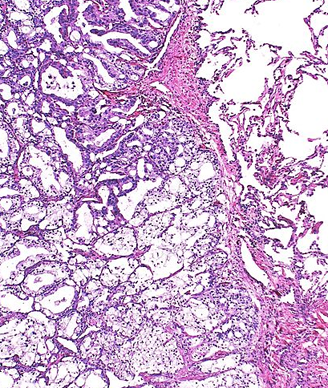Site of Visceral Metastases Can Dictate Prognosis in Prostate Cancer
An analysis of clinical trials suggests that the site of a prostate cancer patient’s metastases can predict survival following treatment with docetaxel.
Metastatic prostatic adenocarcinoma; source: CFCF, Wikimedia Commons

A pooled analysis of five phase III clinical trials suggests that the site of a metastatic castration-resistant prostate cancer (CRPC) patient’s metastases can predict overall survival following treatment with docetaxel. CRPC patients with liver metastases had the worst overall survival-a median of 12.1 months. Those patients with lung metastases fared slightly better with a median overall survival of 16.5 months. Patients with bone metastases, but no visceral metastases had relatively better outcomes-a median overall survival of 20.3 months.
Patients with lung metastases had a 30% increased risk of death compared with patients that had bone metastases. Median overall survival was 20 months in men with bone metastases compared with 17 months in men with lung metastases (hazard ratio [HR] = 1.3, P < .001).
Patients with liver metastases had a 40% increased risk of death compared with patients that had lung metastases. Median overall survival was 17 months in patients with lung metastases compared with 12 months in patients with liver metastases (HR = 1.4, P < .001).
The results of the study (abstract #5002) were presented by Susan Halabi, PhD, professor of biostatistics at the Duke University Cancer Institute in Durham, North Carolina, at the 2014 American Society of Clinical Oncology (ASCO) Annual Meeting, held May 30–June 3, in Chicago.
“From individual trials, we have had the suspicion that the distribution of disease is important in terms of prognosis and risk but no clear view across multiple large phase III survival studies in order to draw a firmer conclusion about the impact of the site of metastasis, ” said study author Michael Morris, MD, associate professor at the Memorial Sloan-Kettering Cancer Center in New York.
Halabi and co-authors pooled data from 3,993 metastatic, chemotherapy-naive CRPC patients who took part in five clinical trials that tested different docetaxel regimens. The trials included were SWOG 9916, CALGB 90401, TAX327, ENTHUSE 33, and SWOG 0421.
The median age of patients on the trial was 69 years and 83% of the participants were white. Seventy-nine percent of the patients had bone metastases with no lymph node involvement, 5% had just lymph node involvement, 7% had liver metastases, 8% had lung metastases, and 1% had either adrenal or brain metastases.
Patients with only lymph node involvement had a median overall survival of 27 months while those with any visceral metastases had a median overall survival of 14 months.
Prior studies have suggested a worse prognosis for prostate cancer patients with visceral disease, but those studies mostly had small sample sizes.
According to Halabi, these data confirm that metastatic CRPC patients with lung or liver metastases treated with docetaxel represent intermediate and poor prognostic subgroups, respectively.
For now, it is not clear whether patients with different sites of visceral metastases should be treated differently. “We now have more patients with visceral disease and cannot begin to address the question of whether patients with liver, lung, or other visceral metastases should receive different therapies,” said Morris.
Prolaris in Practice: Guiding ADT Benefits, Clinical Application, and Expert Insights From ACRO 2025
April 15th 2025Steven E. Finkelstein, MD, DABR, FACRO discuses how Prolaris distinguishes itself from other genomic biomarker platforms by providing uniquely actionable clinical information that quantifies the absolute benefit of androgen deprivation therapy when added to radiation therapy, offering clinicians a more precise tool for personalizing prostate cancer treatment strategies.